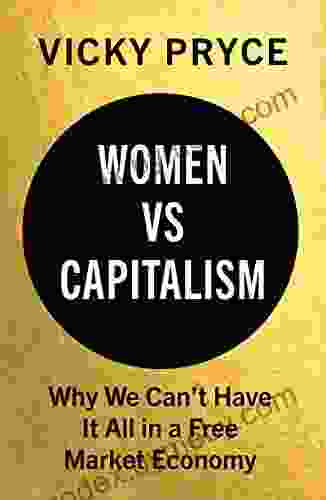Why We Can Have It All In a Free Market Economy

: The Allure of Economic Prosperity
In today's interconnected world, the pursuit of economic well-being is a universal aspiration. The promise of a comfortable life, financial security, and the ability to provide for oneself and loved ones drives individuals and societies forward.
4.4 out of 5
| Language | : | English |
| File size | : | 3907 KB |
| Text-to-Speech | : | Enabled |
| Screen Reader | : | Supported |
| Enhanced typesetting | : | Enabled |
| Word Wise | : | Enabled |
| Print length | : | 364 pages |
| Lending | : | Enabled |
Yet, the path to economic prosperity is often fraught with challenges. Economic systems vary widely, each with its own strengths and drawbacks. Therefore, it is imperative to understand the principles that govern these systems and their impact on economic outcomes.
Unveiling the Free Market Economy: A Catalyst for Economic Growth
Among the various economic systems, a free market economy stands out as a powerful engine for wealth creation and economic progress. This system is characterized by:
- Limited Government Intervention: In a free market economy, the government plays a minimal role in regulating economic activity. Businesses are free to operate without excessive government interference, allowing them to innovate and compete.
- Entrepreneurship and Innovation: A free market environment fosters entrepreneurship and encourages individuals to take risks and start businesses. This leads to the creation of new products, services, and technologies, driving economic growth.
- Creative Destruction: Within a free market system, innovation inevitably renders some existing businesses and industries obsolete. This process known as "creative destruction" allows new and more efficient businesses to emerge, rejuvenating the economy.
The free market economy embodies the principle that when individuals are free to pursue their economic interests without undue government intervention, the collective outcome is economic prosperity.
Pillars of a Free Market Economy: Empowering Individuals
The success of a free market economy rests upon several fundamental pillars:
- Private Property Rights: Secure property rights incentivize individuals and businesses to invest in the production of goods and services, knowing that their investments will be protected.
- Free Trade: The absence of barriers to trade allows businesses to operate globally, increasing competition and driving down prices for consumers.
- Sound Monetary Policy: Responsible management of the money supply promotes price stability and prevents inflation, fostering a stable investment climate.
- Rule of Law: A well-established legal framework ensures that contracts are enforced and disputes are resolved fairly, creating an environment conducive to economic activity.
By safeguarding these pillars, a free market economy empowers individuals to make economic decisions, stimulate economic growth, and ultimately improve their own well-being.
Benefits of a Free Market Economy: Prosperity for All
The adoption of a free market economy has numerous benefits:
- Higher Standard of Living: Free markets lead to increased productivity and innovation, resulting in a wider variety of goods and services at lower prices, raising the standard of living for all.
- Job Creation: The entrepreneurial spirit inherent in free markets creates new businesses and job opportunities, reducing unemployment and promoting economic mobility.
- Consumer Choice: Free markets offer consumers a vast array of choices, enabling them to select products and services that best meet their needs and preferences.
- Economic Stability: The dynamic nature of free markets promotes resilience in the face of economic shocks, leading to long-term economic stability and growth.
By unleashing the power of individuals and businesses, a free market economy sets the stage for a prosperous and thriving society.
Dynamic Equilibrium: The Ever-Evolving Nature of Free Markets
One important concept in a free market economy is dynamic equilibrium. This refers to the continuous adjustment of supply and demand in response to changing conditions.
As new technologies or consumer preferences emerge, businesses adapt and innovate, leading to the creation of new industries and the decline of others. This process of creative destruction ensures that resources are allocated efficiently and that the economy remains dynamic and responsive to evolving needs.
However, it is important to note that governments may need to intervene occasionally to address market failures or provide a safety net for vulnerable populations. Nevertheless, such interventions should be carefully designed to minimize disruption to the free market system and maximize overall economic welfare.
: Embracing the Free Market for Collective Prosperity
The principles of a free market economy provide a roadmap for economic growth and prosperity. By empowering individuals, fostering innovation, and promoting competition, free markets unlock the potential of nations and communities.
The book 'Why We Can Have It All' offers a comprehensive analysis of the free market economy, its benefits, and the challenges it faces. It serves as an invaluable guide for policymakers, business leaders, and individuals seeking to understand the complexities of economic systems and the path to sustainable economic well-being.
By embracing the principles of a free market economy, we can create a more prosperous, equitable, and dynamic society for all.
4.4 out of 5
| Language | : | English |
| File size | : | 3907 KB |
| Text-to-Speech | : | Enabled |
| Screen Reader | : | Supported |
| Enhanced typesetting | : | Enabled |
| Word Wise | : | Enabled |
| Print length | : | 364 pages |
| Lending | : | Enabled |
Do you want to contribute by writing guest posts on this blog?
Please contact us and send us a resume of previous articles that you have written.
 Book
Book Novel
Novel Page
Page Chapter
Chapter Text
Text Story
Story Genre
Genre Reader
Reader Library
Library Paperback
Paperback E-book
E-book Magazine
Magazine Newspaper
Newspaper Paragraph
Paragraph Sentence
Sentence Bookmark
Bookmark Shelf
Shelf Glossary
Glossary Bibliography
Bibliography Foreword
Foreword Preface
Preface Synopsis
Synopsis Annotation
Annotation Footnote
Footnote Manuscript
Manuscript Scroll
Scroll Codex
Codex Tome
Tome Bestseller
Bestseller Classics
Classics Library card
Library card Narrative
Narrative Biography
Biography Autobiography
Autobiography Memoir
Memoir Reference
Reference Encyclopedia
Encyclopedia Lisa Cordeiro
Lisa Cordeiro Dan Morrison
Dan Morrison Thomas Nelson
Thomas Nelson Osman Yousefzada
Osman Yousefzada Gabrielle Hamilton
Gabrielle Hamilton Lorakim Joyner
Lorakim Joyner Marsha M Linehan
Marsha M Linehan Jennifer Morhaime
Jennifer Morhaime Christina Klein
Christina Klein Chonda Pierce
Chonda Pierce Claire Maxted
Claire Maxted Chris Higgs
Chris Higgs Jarrod Musick
Jarrod Musick Christelle Dabos
Christelle Dabos Julie Satow
Julie Satow Christopher Lakeman
Christopher Lakeman Christopher Hopper
Christopher Hopper Satish Gaire
Satish Gaire Christine Copper
Christine Copper Claire Fraise
Claire Fraise
Light bulbAdvertise smarter! Our strategic ad space ensures maximum exposure. Reserve your spot today!

 Corbin PowellChants, Harp Singing, Hymns, Psalms, Spirituals, Railroad Gospels: A Journey...
Corbin PowellChants, Harp Singing, Hymns, Psalms, Spirituals, Railroad Gospels: A Journey...
 Nathaniel PowellUnleash the Power of Math with McGraw Hill Education Math Grade Second...
Nathaniel PowellUnleash the Power of Math with McGraw Hill Education Math Grade Second... Deacon BellFollow ·6.3k
Deacon BellFollow ·6.3k Robert FrostFollow ·2.8k
Robert FrostFollow ·2.8k Milan KunderaFollow ·18.3k
Milan KunderaFollow ·18.3k Billy FosterFollow ·10k
Billy FosterFollow ·10k Jarrett BlairFollow ·19.9k
Jarrett BlairFollow ·19.9k Thomas HardyFollow ·5.3k
Thomas HardyFollow ·5.3k Chris ColemanFollow ·10.3k
Chris ColemanFollow ·10.3k Ignacio HayesFollow ·11.2k
Ignacio HayesFollow ·11.2k

 Rick Nelson
Rick NelsonThe Power of Positivity: 51 Motivational Quotes to...
In the tapestry of life, we encounter...

 Lee Simmons
Lee SimmonsThe Indian War of 1864: A Devastating Conflict in the...
The Indian War of 1864 was a brutal...

 Eddie Bell
Eddie BellQueen: The Unauthorized Biography: Unraveling the Secrets...
Prepare to delve into the captivating...

 Dion Reed
Dion ReedUnveiling the Imperfect Gems of Trauma and...
In the tapestry of...

 Desmond Foster
Desmond FosterThirty-Six Years in the Rockies: A Timeless Masterpiece...
A Journey Through Time and...
4.4 out of 5
| Language | : | English |
| File size | : | 3907 KB |
| Text-to-Speech | : | Enabled |
| Screen Reader | : | Supported |
| Enhanced typesetting | : | Enabled |
| Word Wise | : | Enabled |
| Print length | : | 364 pages |
| Lending | : | Enabled |










